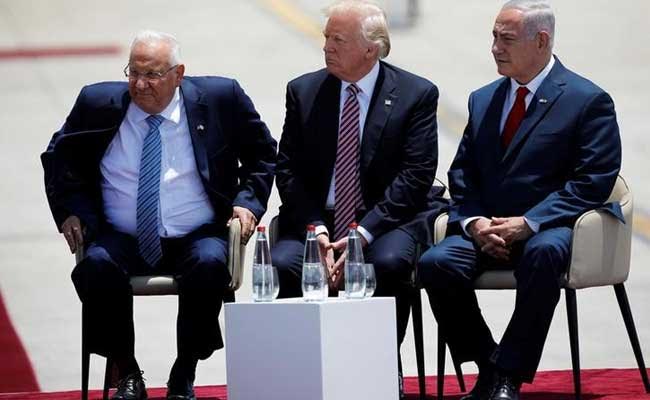Trump's Proposed Corporate Tax Cut: In Perspective
By Norman Carr May 09, 2017
Not surprisingly, this composite taxpayer paid a lot less tax under the proposals.
"The numbers do not add up", Judd said.
The plan would consolidate the current seven tax brackets into three, double the standard deduction, lower the corporate income tax and allow people to file taxes on a postcard if they choose.
The other respondent who said that Trump's tax cuts would pay for themselves was Bengt Holmstrom of the Massachusetts Institute of Technology, who confirmed in an email to The Washington Post that he had also misread the question.
As House Republicans turn their attention toward a sweeping overhaul of the tax code, they're struggling with two things: how much the package will cost and how much of that expense should be covered up front. Only the most wealthy in this country pay this tax.
Another big unknown revolves around the interface between individual income tax rates and the proposed 15 percent corporate tax rate.
What's more, some privately held large companies - including Trump's own real estate empire - are structured as pass-throughs and would benefit, too. It is disappointing that where the White House ended up last week was really offering less information about what its goals and thoughts are as far as tax changes than it did during the campaign.
Making major tax reform temporary - even for 10 years - undermines its effectiveness because many business projects and decisions depend on forecasting beyond that period. The economy has not grown 3 percent or more per year since 2005; it's the longest stretch ever of sub-par growth less than 3 percent. The Obama administration had proposed cutting it to 28 percent. The bill repeals roughly $600 billion in taxes on upper-income earners, insurers, drug companies and others that the Affordable Care Act imposed to fund expanded insurance coverage. The new rate of 15% would bring it on a par with Canada and Germany.
The Trump team stressed the benefits that might flow to small businesses.
Democrats see a winning issue in opposing GOP health bill
Trump also wants a huge military build-up matched by cuts to popular domestic programs and foreign aid accounts. Mark Dayton, a Democrat, is resolute on that issue: "I would not entertain that notion", he said.
Trump also calls for eliminating the estate tax. He had previously set up his own company, according to state media reports. "The biggest tax cut in the history of our country".
And the Trump administration insists that handing more wealth to the wealthy will result in more job opportunities for the middle class. This change lowers the top rate from 39.6 percent.
Most experts, however, are skeptical.
Calculated on a per capita basis, Californians claimed $2,116 in federal income tax deductions, while Nevadans claimed only $166 per person for sales tax deductions. This is known as a "territorial" system.
Consequently, the shift to a territorial system, where taxes are paid only in the jurisdiction where profit is earned, is a highly likely outcome within tax reform. These profits may be taxed in the future, if they are repatriated. Judging from its past calculations, the JCT is likely to agree with independent budget wonks, on the left and right, who have concluded that Trump's plan would create a gusher of red ink.
"The corporate tax cuts that happened over the last decade have given Canada a tax advantage over the United States", said Craig Alexander, chief economist for the Conference Board of Canada. The revenue surge of the Reagan tax cuts, for example, was largely missed. "The reality is that congressional representatives who want re-election are reluctant to support any legislation that might increase the tax burden to firms in their districts". Bank of America Merrill Lynch chief economist, Ethan S Harris wrote in a note to clients on Monday that: "It is very hard to price intangible capital because there is usually no "market" to generate comparable prices". That would require growth to accelerate almost a full percentage point, to 2.8 percent a year, from its current level.
Trump would like to use debt to fuel a decade of fiscal expansion to deliver 25 million new U.S. jobs and to restore 4 percent annual growth.
To be sure, the reform has its opponents, namely the conservative billionaire Koch Brothers, and other dissenters, who argue that the status-quo tax policies are in the nation's best interests.
You may also like...
-
 LeBron James scores 35 points, Cavaliers sweep Raptors
LeBron James scores 35 points, Cavaliers sweep Raptors
-
After a week off, Curry, Warriors roll past Jazz in Game 1
-
-
 Poor officiating not the reason Celtics lost to Wizards
Poor officiating not the reason Celtics lost to Wizards
-
-
-
-
-
-
Advertisement
-
Leadership
 What to know as Texas nears passing 'sanctuary city' law
What to know as Texas nears passing 'sanctuary city' law
May 08, 2017Sore ankle keeps Raptors G Lowry out of starting lineup
May 08, 2017Crude prices hit 5-month lows as glut fears weigh
May 07, 2017 It's Time to Rethink Berkshire Hathaway Inc. (BRK.B) Stock
It's Time to Rethink Berkshire Hathaway Inc. (BRK.B) Stock
May 06, 2017Obamacare is 'dead' hails triumphant Trump
May 06, 2017 -
-
The Latest












